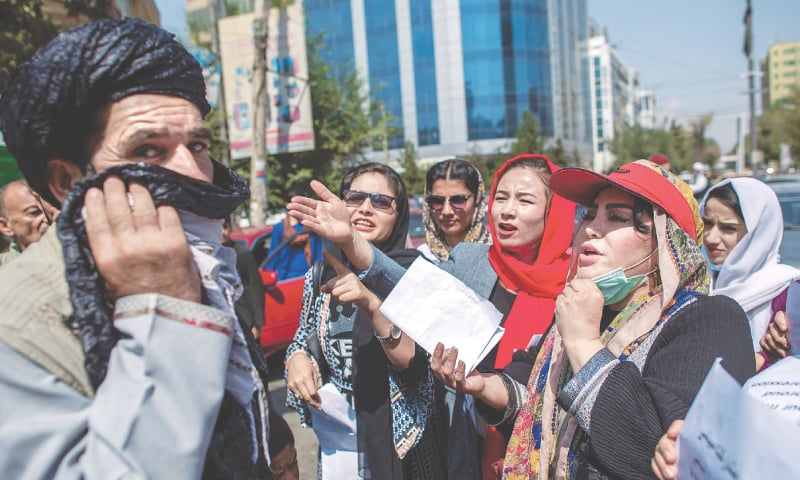KABUL: Female employees in the Kabul city government have been told to stay home, with work only allowed for those who cannot be replaced by men, the interim mayor of Afghanistan’s capital said on Sunday, detailing the latest restrictions on women by the new Taliban rulers.
The decision to prevent most female city workers from returning to their jobs is another sign that the Taliban, who overran Kabul last month, are enforcing their harsh interpretation of Islam despite initial promises by some that they would be tolerant and inclusive. In their previous rule in the 1990s, the Taliban had barred girls and women from schools, jobs and public life.
In recent days, the new Taliban government issued several decrees rolling back the rights of girls and women. It told female middle- and high school students that they could not return to school for the time being, while boys in those grades resumed studies this weekend. Female university students were informed that studies would take place in gender-segregated settings from now on, and that they must abide by a strict Islamic dress code. Under the US-backed government deposed by the Taliban, university studies had been co-ed, for the most part.
On Friday, the Taliban shut down the Women’s Affairs Ministry, replacing it with a ministry for the propagation of virtue and the prevention of vice” and tasked with enforcing Islamic law.
On Sunday, just over a dozen women staged a protest outside the ministry, holding up signs calling for the participation of women in public life. “A society in which women are not active is (sic) dead society,” one sign read.
The protest lasted for about 10 minutes. After a short verbal confrontation with a man, the women got into cars and left, as Taliban in two cars observed from nearby. Over the past months, Taliban fighters had broken up several women’s protests by force.
Elsewhere, about 30 women, many of them young, held a news conference in a basement of a home tucked away in a Kabul neighbourhood. Marzia Ahmadi, a rights activist and government employee now forced to sit at home, said they would demand the Taliban re-open public spaces to women.
“Its our right, she said. We want to talk to them. We want to tell them that we have the same rights as they have.” Most of the participants said they would try to leave the country if they had an opportunity.Interim Kabul Mayor Hamdullah Namony gave his first news conference since being appointed by the Taliban.
He said that before the Taliban takeover last month, just under one-third of close to 3,000 city employees were women, and that they had worked in all departments.
Namony said the female employees have been ordered to stay home, pending a further decision. He said exceptions were made for women who could not be replaced by men, including some in the design and engineering departments and the attendants of public toilets for women. Namony did not say how many female employees were forced to stay home.
There are some areas that men can’t do it, we have to ask our female staff to fulfill their duties, there is no alternative for it, he said.
Across Afghanistan, women in many areas have been told to stay home from jobs, both in the public and private sectors. However, the Taliban have not yet announced a uniform policy. The comments by the Kabul mayor were unusually specific and affected a large female work force that had been involved in running a sprawling city of more than 5 million people.
Namony also said the new government has begun removing security barriers in Kabul, a city that has endured frequent bombing and shooting attacks. Such barriers erected near ministries, embassies and private homes of politicians and warlords had been commonplace in Kabul for years.
Published in Dawn, September 20th, 2021













































